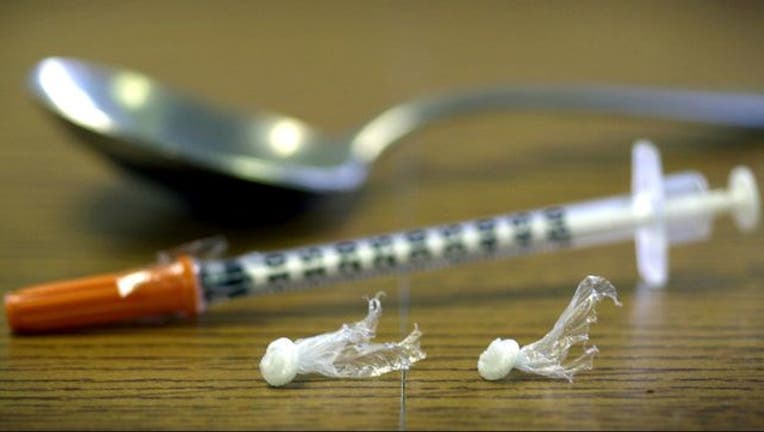Should drug dealers be charged with murder? States ponder

Photo via FoxNews.com
STAFFORD, Conn. (AP) - Having lost his 29-year-old son to a fentanyl overdose, Dean Palozej believes dealers who peddle drugs that kill should be locked up for a very long time - for the rest of their life, in some cases.
A state representative who heard the story felt the same way. With a piece of legislation introduced this year, he joined lawmakers around the country who have been pushing for murder or manslaughter charges in a get-tough campaign against people who supply drugs that cause fatal overdoses, in efforts to curb the opioid overdose crisis.
Spencer Palozej died Feb. 1, 2018, one day shy of his 30th birthday, at his home in Manchester. In frequent pain from injuries and surgeries, he would occasionally buy oxycodone pills from an acquaintance but received fentanyl-laced pills in his last purchase instead, Dean Palozej said. No arrests have been made.
"If they're dealing fentanyl ... they're just pumping poison out into the streets," Dean Palozej said. "I'd like to see these guys on a first offense get three to five years. The second offense, charge them with murder. This is going on way too much. People are dying."
Lawmakers in Connecticut, Hawaii, Mississippi and Virginia have proposed murder and manslaughter charges for overdoses this year. Several states passed such laws over the past two years, while others have taken to charging drug deaths under murder and manslaughter statutes that don't specifically mention overdoses.
Twenty states now have so-called "drug-induced homicide" laws that carry the same sentences as murder and manslaughter, according to the Drug Policy Alliance, a nonprofit drug policy organization based in New York.
Federal law has included a penalty of 20 years to life in prison for providing drugs that cause fatal overdoses since Congress passed the Anti-Drug Abuse Act of 1986, spurred by the cocaine overdose death of basketball star Len Bias that year.
There is a debate, however, about whether such laws are good policy. Supporters say the laws are needed to properly punish and deter dealers and others who supply drugs that kill. Opponents argue those laws are not a deterrent, discourage people from calling 911 for help for overdose victims and help fuel higher arrest rates of minorities.
"Supply-side tactics really haven't been proven to work over the past five decades they've been implemented," said Lindsay LaSalle, director of public health law and policy for the Drug Policy Alliance. "I think the focus needs to be on the demand."
Statistics on murder, manslaughter and homicide prosecutions involving overdoses are not widely available because few state and local government agencies keep track. But from 2011 to 2016, the number of news stories about people charged with or prosecuted for drug-induced homicides increased from 363 to 1,178 - more than a 300 percent increase that corresponds with the rise of opioid-related deaths, according to the alliance.
Around 47,600 Americans died of opioid overdoses in 2017, a 13 percent increase compared with 2016 and more than 2½ times as many as the 18,515 opioid deaths in 2007, federal data shows. The rise of the highly potent fentanyl is the reason, law enforcement officials say.
Connecticut state Rep. Kurt Vail, a Republican who represents Dean Palozej's hometown of Stafford, introduced the proposed law in their state in January after talking with Palozej after Spencer's death. The law would make it murder to supply drugs that cause a fatal overdose, and conviction would bring a prison sentence of up to 60 years.
"I think it was kind of time to up the punishment and make it more of a deterrent to deal to these people that are using opioids," said Vail, a former correctional officer. "Those people who are taking advantage of these people who are addicted, they are scumbags."
A similar bill proposed by Vail in 2017, in response to increasing overdose deaths in his district, died in committee.
Legislation treating overdoses as murder or manslaughter also was introduced this year in Hawaii, Mississippi and Virginia. The Mississippi bill died in committee, while the others remain pending.
Police have not made an arrest in connection with Spencer Palozej's death but have been keeping tabs on a suspect, Dean Palozej said. Shortly before his death, Spencer Palozej texted the suspect to bring him "just the regular," Dean Palozej said.
Manchester Detective Lt. John Rossetti, whose department has been investigating Spencer Palozej's death, said it often is difficult to charge someone who supplies drugs that cause an overdose. The main obstacles are finding the dealers, catching them with drugs and proving those drugs are the same ones that killed the overdose victims, he said. He declined to comment on the Spencer Palozej investigation.
Dean Palozej is upset that no arrests have been made more than a year after his son's death.
"We cry everyday all of us. It truly broke all our hearts," he said. "We have to get some laws in place that lock these guys up."

